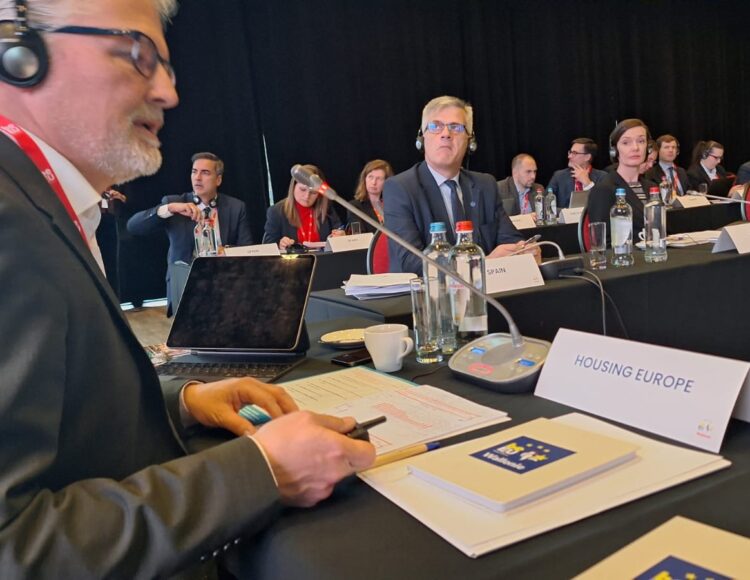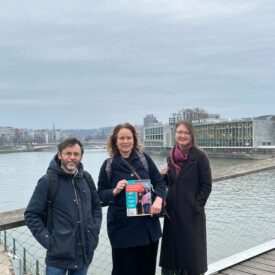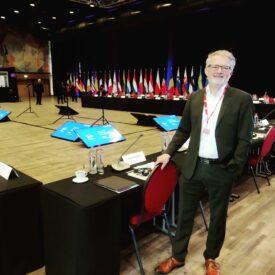The policymakers who are shaping our housing systems met in the Belgian city of Liège to propose solutions to improve access to affordable, decent housing for all within the European Union. Housing Europe’s President, Bent Madsen addressed the EU housing ministers presenting to them the state of housing we are living in, as well as why a new housing paradigm is urgently needed.
Bent Madsen stressed that the current housing situation in most parts of the EU is characterised by a lack of public spending and capital investment. The total amount spent directly by the 27 EU countries to build housing or to provide subsidies/support for housing development was approximately €15 billion in 2020. In contrast, €40 billion was spent on housing-related income ‘top-ups’ in the same year.
Making the maths is easy.
“Capital investment is a one-time measure with long-term benefits, while income supports often perpetuate unaffordability and increase housing demand without impacting supply and changing the places we live in for the better,” our President insisted.
Evident from discussions among housing ministers was the consensus on the critical importance of securing public funding to address housing needs and tackling the proliferation of short-term lets, identified as core concerns for many countries.
The deepening housing crisis in nearly all corners of Europe made the 27 ministers responsible for housing within the EU officially call for a European New Deal for Affordable and Social Housing.
The newly-released Liège Declaration clearly outlines the societal, economic, environmental payback that a critical mass of social and affordable housing can offer.
Housing policymakers in Europe agreed that…
- Investing in affordable housing has a proven multiplier effect on the local economy, creating local employment opportunities and retaining investment in the local and regional economy.
- The availability of affordable housing is a key factor influencing work-related mobility and determining access to employment opportunities and is therefore essential to the competitiveness of our economies.
- The link between housing conditions and health and well-being has been increasingly documented over the years. The role of housing as a social determinant of health has become even clearer recently in the light of the COVID-19 pandemic.
- Last but not least, “greener” and sustainable housing is essential if we are to reduce CO2 emissions and combat climate change. In addition, public policies to promote energy-efficient renovation are also a response to fuel poverty.
Coming to the same conclusion, housing ministers recognised the need to develop a new approach and cooperate to ensure that the development of affordable and adequate housing can meet social, economic, and territorial needs. The Declaration also emphasises that the renovation, adaptation and resilience of the affordable and social European stock against climate change and natural disasters is urgently needed.
At EU level, the Ministers called for a European New Deal for Affordable and Social Housing.
How does the Deal translate?
The European Commission, in partnership with the European Parliament, European Economic and Social Committee and the European Committee of the Regions, should organise an ANNUAL EU SUMMIT on social and affordable housing, bringing together all the stakeholders involved in the implementation of Member States’ actions on social and affordable housing, on the basis of a multi-level approach and exchange of best practices in compliance with the principle of subsidiarity.
The European Commission should develop an EU PLATFORM to urgently support national, regional and local partnership to end housing exclusion. The Platform should share best practice, encourage long-term national, regional and local partnerships, support skill development, and work with the already existing European Platform on Combatting Homelessness.
The European Commission should take better account of the REPERCUSSIONS of EU policies on access to housing and housing exclusion in its impact assessments.
The European Investment Bank (EIB) was called to reinforce its SUPPORT for the social and affordable housing sector, renewing its lending and advisory services to address the supply shortage.
In Liége, our Danish member, Lars Græsborg Mathiasen, a video journalist from BL found a moment to speak with Nicolas Schmit, the EU commissioner for employment and social rights and social democratic candidate for the presidency of the European Commission. He clearly shared his intention to move the ongoing housing crisis all the way up to EU’s policymaking priority list. Watch this interview.



